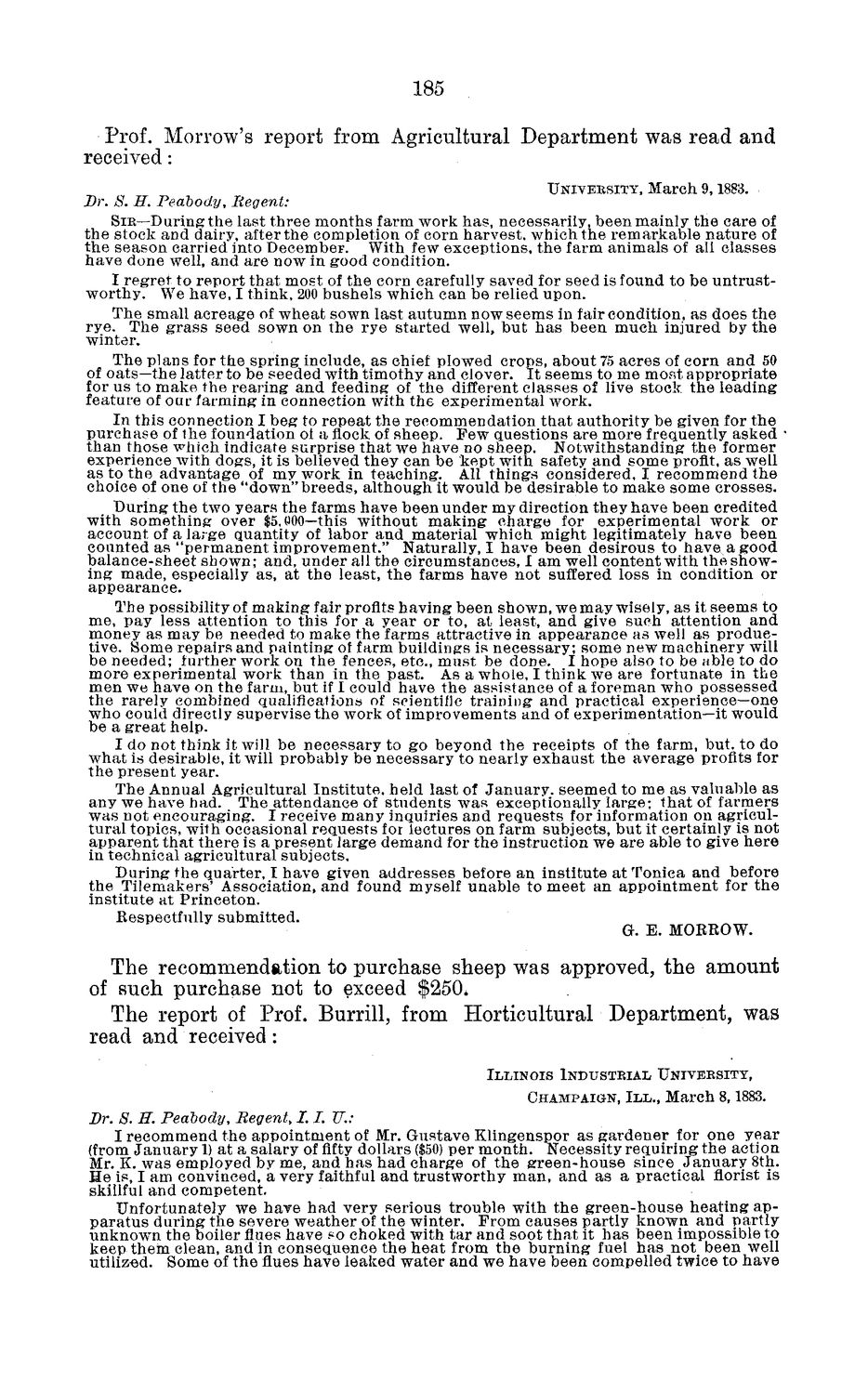| |
| |
Caption: Board of Trustees Minutes - 1884
This is a reduced-resolution page image for fast online browsing.

EXTRACTED TEXT FROM PAGE:
185 Prof. Morrow's report from Agricultural Department was read and received: UNIVEESITY, March 9,1883. Dr. S. H. Peabody, Regent: SIR—During the last three months farm work has, necessarily, been mainly the care of the stock and dairy, after the completion of corn harvest, which the remarkable nature of the season carried into December. With few exceptions, the farm animals of all classes have done well, and are now in good condition. I regret to report that most of the corn carefully saved for seed is found to be untrustworthy. We have, I think, 200 bushels which can be relied upon. The small acreage of wheat sown last autumn now seems in fair condition, as does the rye. The grass seed sown on the rye started well, but has been much injured by the winter. The plans for the spring include, as chief plowed crops, about 75 acres of corn and 50 of oats—the latter to be seeded with timothy and clover. It seems to me most appropriate for us to make the rearing and feeding of the different classes of live stock the leading feature of our farming in connection with the experimental work. In this connection I beg to repeat the recommendation that authority be given for the purchase of the foundation ot a flock of sheep. Few questions are more frequently asked ' than those which indicate surprise that we have no sheep. Notwithstanding the former experience with dogs, it is believed they can be kept with safety and some profit, as well as to the advantage of my work in teaching. All things considered, I recommend the choice of one of the "down" breeds, although it would be desirable to make some crosses. During the two years the farms have been under my direction they have been credited with something over $5. WOO—this without making charge for experimental work or account of a large quantity of labor and material which might legitimately have been counted as "permanent improvement." Naturally, I have been desirous to have a good balance-sheet shown; and, under all the circumstances, I am well content with the showing made, especially as, at the least, the farms have not suffered loss in condition or appearance. The possibility of making fair profits having been shown, we may wisely, as it seems to me, pay less attention to this for a year or to, at least, and give such attention and money as may be needed to make the farms attractive in appearance as well as productive. Some repairs and painting ot farm buildings is necessary; some new machinery will be needed; further work on the fences, etc., must be done. I hope also to be able to do more experimental work than in the past. As a whole, I think we are fortunate in the men we have on the farm, but if I could nave the assistance of a foreman who possessed the rarely combined qualifications of scientific training and practical experience—one who could directly supervise the work of improvements and of experimentation—it would be a great help. I do not think it will be necessary to go beyond the receipts of the farm, but, to do what is desirable, it will probably be necessary to nearly exhaust the average profits for the present year. The Annual Agricultural Institute, held last of January, seemed to me as valuable as any we have had. The attendance of students was exceptionally large; that of farmers was not encouraging. I receive many inquiries and requests for information on agricultural topics, with occasional requests for lectures on farm subjects, but it certainly is not apparent that there is a present large demand for the instruction we are able to give here in technical agricultural subjects. Daring the quarter, I have given addresses before an institute at Toniea and before the Tilemakers' Association, and found myself unable to meet an appointment for the institute at Princeton. Respectfully submitted. G. E. MORROW. The recommendation to purchase sheep was approved, the amount of such purchase not to exceed $250. The report of Prof. Burrill, from Horticultural Department, was read and received: ILLINOIS INDUSTRIAL UNIVERSITY, CHAMPAIGN, I I I . , March 8,1883. Dr. S. H. Peabody, Regent, 1.1. IT.: I recommend the appointment of Mr. Gustave Klingenspor as gardener for one year (from January 1) at a salary of fifty dollars ($50) per month. Necessity requiring the action Mr. K. was employed by me, and has had charge of the green-house since January 8th. He is, I am convinced, a very faithful and trustworthy man, and as a practical florist is skillful and competent. Unfortunately we have had very serious trouble with the green-house heating apparatus during the severe weather of the winter. From causes partly known and partly unknown the boiler flues have so choked with tar and soot that it has been impossible to keep them clean, and in consequence the heat from the burning fuel has not been well utilized. Some of the flues have leaked water and we have been compelled twice to have
| |